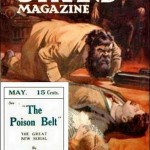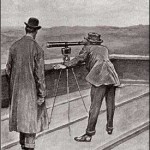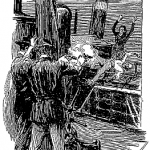“You bet,” said Ezra, with a loud laugh. “But at present she has the pull. Her mind is still running on that fellow.”
“She spoke bitterly enough of him this morning.”
“So she might, but she thinks of him none the less. If I could once make her thoroughly realize that he had thrown her over I might catch her on the hop. She’d marry for spite if she wouldn’t for love.”
“Just so; just so. Wait a bit. That can be managed, I think, if you will leave it to me.”
The old man brooded over the problem all day, for from week to week the necessity for the money was becoming more pressing, and that money could only be hoped for through the success of Ezra’s wooing. No wonder that every little detail which might sway the balance one way or the other was anxiously pondered over by the head of the firm, and that even the fluctuations in oil and ivory became secondary to this great object.
Next day, immediately after they had sat down to dinner, some letters were handed in by the footman. “Forwarded on from the office, sir,” said the flunkey. “The clerk says that Mr. Gilray was away and that he did not like to open them.”
“Just like him!” said Girdlestone, peevishly pushing back his plate of soup. “I hate doing business out of hours.” He tore the envelopes off the various letters as he spoke. “What’s this? Casks returned as per invoice; that’s all right. Note from Rudder & Saxe—that can be answered to-morrow. Memorandum on the Custom duties at Sierra Leone. Hallo! what have we here? ‘My darling Tom’—who is this from—Yours ever, Mary Ossary.’ Why, it’s one of young Dimsdale’s love-letters which has got mixed up with my business papers. Ha! ha! I must really apologize to him for having opened it, but he must take his chance of that, if he has his correspondence sent to the office. I take it for granted that everything there is a business communication.”
Kate’s face grew very white as she listened. She ate little dinner that day, poor child, and took the earliest opportunity of retiring to her room.
“You did that uncommonly well, dad,” said Ezra approvingly, after she was gone. “It hit her hard, I could see that.”
“I think it touched her pride. People should not have pride. We are warned against it. Now, that same pride of hers will forbid her ever thinking of that young man again.”
“And you had the letter written?”
“I wrote it myself. I think, in such a case, any stratagem is justifiable. Such large interests are at stake that we must adopt strong measures. I quite agree with the old Churchmen that the end occasionally justifies the means.”
“Capital, dad; very good!” cried Ezra, chewing his toothpick. “I like to hear you argue. It’s quite refreshing.”
“I act according to the lights which are vouchsafed me,” said John Girdlestone gravely; on which Ezra leaned back in his chair and laughed heartily.
The very next morning the merchant spoke to Dimsdale on the matter, for he had observed signs of impatience in the young man, and feared that some sudden impulse might lead him to break his promise and so upset everything.
“Take a seat. I should like to have a word with you,” he said graciously, when his junior partner appeared before him to consult with him as to the duties of the day. Tom sat down with hope in his heart.
“It is only fair to you, Mr. Dimsdale,” Girdlestone said, in a kindly voice, “that I should express to you my appreciation of your honourable conduct. You have kept your promise in regard to Miss Harston in the fullest manner.”
“Of course I kept my promise,” said Tom bluntly. “I trust, however, that you will soon see your way to withdrawing your prohibition. It has been a hard trial to me.”
“I have insisted upon it because it seemed to me to be my duty. Every one takes his own view upon such points, and it has always been my custom throughout life to take what some might think a stringent one. It appears to me that I owe it to my deceased friend to prevent his daughter, whom he has confided to me, from making any mistake. As I said before, if you continue to show that you are worthy of her, I may think more favourably of it. Exemplary as your conduct has been since you joined us, I believe that I am not wrong in stating that you were a little wild when you were at Edinburgh.”
“I never did anything that I am ashamed of,” said Tom.
“Very likely not,” Girdlestone answered, with an irrepressible sneer.
“The question is, did you do anything that your father was ashamed of?”
“Certainly not,” cried Tom hotly. “I was no milksop or psalm singer, but there is nothing that I ever did there of which I should be ashamed of my father knowing.”
“Don’t speak lightly of psalm singing. It is a good practice in its way, and you would have been none the worse had you indulged in it perhaps. However, that is neither here nor there. What I want you clearly to understand is that my ultimate consent to your union depends entirely upon your own conduct. Above all, I insist that you refrain from unsettling the girl’s mind at present.”
“I have already promised. Hard as the struggle may be, I shall not break my word. I have the consolation of knowing that if we were separated for twenty years we should still be true to one another.”
“That’s very satisfactory,” said the merchant grimly.
“Nevertheless it is a weary, weary time. If I could only write a line—”
“Not a word,” Girdlestone interrupted. “It is only because I trust you that I keep her in London at all. If I thought there was a possibility of your doing such a thing I should remove her at once.”
“I shall do nothing without your permission,” Tom said, taking up his hat to go. He paused with his hand upon the door. “If ever it seems good to me,” he said, “I consider that by giving you due notice I absolve myself from my promise.”
“You would not do anything so foolish.”
“Still I reserve myself the right of doing so,” said Tom, and went off with a heavy heart to his day’s work.
“Everything is clear for you now,” the old man said to his son triumphantly. “There’s no chance of interference, and the girl is in the very humour to be won. I flatter myself that it has been managed with tact. Remember that all is at stake, and go in and win.”
“I shall go in,” said Ezra “and I think the chances are that I shall win too.”
At which reassuring speech the old man laughed, and slapped his son approvingly upon the shoulder.




